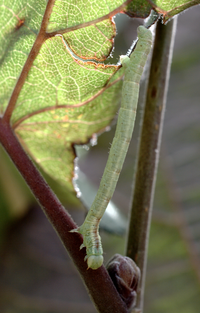
The small fan-footed wave is a moth of the family Geometridae. The species was first described by Johann Siegfried Hufnagel in 1767.
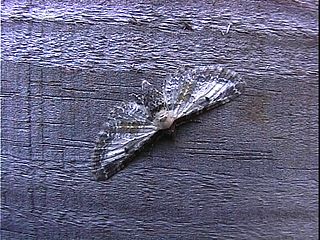
The bordered pug is a moth of the family Geometridae. It is found across the Palearctic region. In the Pyrenees, the species can be found up to an altitude of 1800 metres. It prefers steppe areas, open bushy terrain, fallow and unimproved grasslands and parkland.

The scalloped oak is a moth of the family Geometridae. The species was first described by Carl Linnaeus in his 1758 10th edition of Systema Naturae.

The feathered thorn is a moth of the family Geometridae. It was first described by Carl Linnaeus in 1761.

Angerona is a monotypic moth genus in the family Geometridae erected by Philogène Auguste Joseph Duponchel in 1829. Its only species, Angerona prunaria, the orange moth, was first described by Carl Linnaeus in his 1758 10th edition of Systema Naturae.

Idaea dimidiata, the single-dotted wave, is a moth of the family Geometridae. It is a Holarctic species.

Idaea muricata, the purple-bordered gold, is a moth of the family Geometridae. It was first described by Johann Siegfried Hufnagel in 1767 and is found in the Palearctic.

Cyclophora albipunctata, the birch mocha, is a moth of the family Geometridae. The species was first described by Johann Siegfried Hufnagel in 1767. It is found in the Palearctic. The southern boundary runs westward along the French Atlantic coast and to the British Isles and north of the Alps. In the east, the species ranges to the Pacific Ocean. South of the northern Alps line, it is found at some high elevation areas and mountains. In the Pyrenees, the Massif Central, the southern Alps, the northern Dinaric Alps, in the western and northern Carpathians, in northern Turkey and the Caucasus. In the north, the range extends up to the Arctic Circle. In the Far East the nominate subspecies is replaced by Cyclophora albipunctata griseolataStaudinger, 1897.

Cepphis advenaria, the little thorn, is a moth of the family Geometridae. The species can be found in Europe and across the Palearctic to Japan.

Ecliptopera silaceata, the small phoenix, is a species of moth in the family Geometridae. The species was first described by Michael Denis and Ignaz Schiffermüller in 1775.

Ennomos alniaria, the canary-shouldered thorn, is a moth of the family Geometridae. The species was first described by Carl Linnaeus in his 1758 10th edition of Systema Naturae. It can be found in Europe in a wide variety of biotopes where there are deciduous trees, perhaps mostly in deciduous forests and gardens.

Ennomos autumnaria, the large thorn, is a moth of the family Geometridae. The species can be found in Western and Central Europe East to Russia and Siberia
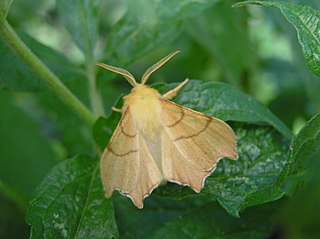
Ennomos erosaria, the September thorn, is a moth of the family Geometridae. The species can be found in the Palearctic realm in western Europe and from central Scandinavia. Its range extends to the northern Mediterranean and east to the Caucasus and Russia. It is widespread in mixed and deciduous forests in Europe. The south eastern occurrence reaches Turkey and the Caucasus. The main habitat is dry deciduous forests and parks. In the Southern Alps, the species rises to an altitude of about 1600 metres.
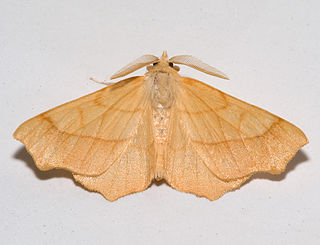
Ennomos quercinaria, the August thorn, is a moth of the family Geometridae. The species can be found in Europe. It was first described by Johann Siegfried Hufnagel in 1767.
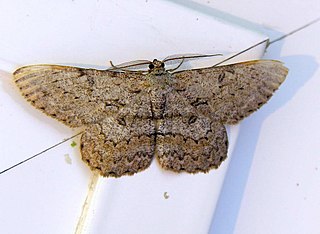
Hypomecis punctinalis, the pale oak beauty, is a moth of the family Geometridae. The species was first described by Giovanni Antonio Scopoli in his 1763 Entomologia Carniolica. The species can be found in central and southern Europe, Asia Minor, Transcaucasia, Russia, the Russian Far East, Japan, Korea, Ussuri and western China.
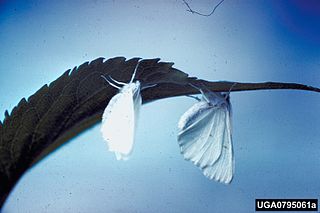
Ennomos is a genus of moths in the family Geometridae erected by Georg Friedrich Treitschke in 1825.

Entephria caesiata, the grey mountain carpet, is a moth of the family Geometridae. The species was first described by Michael Denis and Ignaz Schiffermüller in 1775. It is found in the mountainous areas of Europe, the Caucasus, Asia Minor, Armenia, Russia, Russian Far East, Siberia, northern Mongolia, Sakhalin and Honshū in Japan.

Euphyia biangulata, the cloaked carpet, is a moth of the family Geometridae. It is found in most of Europe and the Middle East.

Lampropteryx otregiata, the Devon carpet, is a moth of the family Geometridae. It is found from western Europe to Japan and the Kuril Islands.
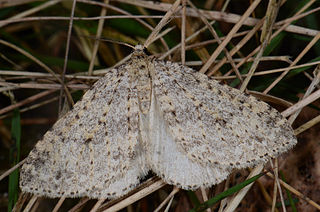
Colostygia multistrigaria, the mottled grey, is a species of moth in the family Geometridae. It is found in western and south-western Europe and North Africa. The habitat is damp woodlands, heaths, and mosses.

